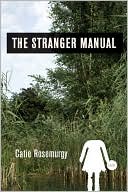It’s been more than 30 years since I heard Bill Matthews remark at a reading that a poet must submit to confusion and fear – and not make poems as charms against them. As intended, his counsel stiffened my spine. Who could argue? Yet if I recall the moment so clearly, or believe I do, it is because I’ve been sparring with his precept’s antitheses all these years, even though they aptly build the bracing point Bill had in mind.
 Perhaps one reason why I admire the power of Catie Rosemurgy’s work is its entwining of submission and charm-making as allied acts, not oppositional. Her second book of poems, The Stranger Manual, is a rout tricked out to look like a romp. The fears are named, then spoofed or honored. But through verbal dexterity, a drilling wit, and the telling insights of a blithely unhinged life coach, Rosemurgy makes poems as charms against the very confusions she dares us to acknowledge.
Perhaps one reason why I admire the power of Catie Rosemurgy’s work is its entwining of submission and charm-making as allied acts, not oppositional. Her second book of poems, The Stranger Manual, is a rout tricked out to look like a romp. The fears are named, then spoofed or honored. But through verbal dexterity, a drilling wit, and the telling insights of a blithely unhinged life coach, Rosemurgy makes poems as charms against the very confusions she dares us to acknowledge.
In her essay “The End of the Novel of Love,” Vivian Gornick writes, “In great novels we always feel that the writer, at the time of the writing, knows as much as anyone around can know, and is struggling to make sense of what is perceived somewhere in the nerve endings if not yet in clarified consciousness.” If I suspect I’m in the presence of a writer who tells me less than what I know, I can’t bear to go on. The same holds for poetry as for the novel. Now that human identity and voice have gone stylishly oblique and fugitive in the work of an entire generation of young poets, the most common sounds of this viral preference unsuccessfully obscure the fact that some poets neither know very much nor have much to say. But in Rosemurgy’s presence, I’m startled by swift and unexpected clarifications that burst out of her narrative frameworks.
 At the center of things is a character named Miss Peach, often either the speaker or the subject of the poems. When she is the topic, the speaker tends to be someone who is “having one of those honeyed afternoons when I don’t know who I am.” In “Neighbor: Miss Peach’s Body Didn’t Turn Out Right,” Miss Peach appears “in a pool on my front steps, asking about lunch, as if the bones / of at least four different animals weren’t loose inside her …” The poem concludes:
At the center of things is a character named Miss Peach, often either the speaker or the subject of the poems. When she is the topic, the speaker tends to be someone who is “having one of those honeyed afternoons when I don’t know who I am.” In “Neighbor: Miss Peach’s Body Didn’t Turn Out Right,” Miss Peach appears “in a pool on my front steps, asking about lunch, as if the bones / of at least four different animals weren’t loose inside her …” The poem concludes:
Someone needs to find her a place to live, a hidey hole we can cram food in
and get away from quickly. We could call her part bird
and be done with it. But everyone is dying right under the surface these days,
especially around the eyes. Death has crawled up into the face
to nibble away whatever blocks its view of the stars.
We’re riddled with it. It’s pulling our flesh
into outrageous, unwilled positions, like the huge smile on my face
as I lift her onto my lap and hold her together for a minute
before I tell her she isn’t welcome here.
The unwelcome is the actual. The poems submit to a complete, imagined vision of a town called Gold River where the ordinary generates a containable terror, the beautiful slumps into decay and gets reconfigured into the gorgeous. But Rosemurgy’s playfulness and quackery are themselves charms against our all-too-successful sinking into the dark currents of Gold River.
Miss Peach may radiate danger, but she seems content to act out bizarre gestures or make socially inappropriate remarks. Of her antagonistic “pledge sisters” in “Miss Peach: The College Years,” she says, “They worship / the pain they think I’m in. Meanwhile, / I’d eat a beetle if I thought its legs / could make my lashes longer. I’ve got all these / organs inside me and I can’t resist teasing them / to see if they’ll go away … They have no respect / for the chisel I would take to the human race.” Her hand is withheld, but her language, reshaped by psychic discomfort, achieves the remodeling of a strangely envisioned world.
The exoticisms of Wallace Stevens echo here (“Winter, on the other hand, / is always mind”) and the disturbed wackiness of James Tate. But in Rosemurgy’s universe, her brutally important reason to tackle the brutal in art often results in a sharpness of tone – which she may mitigate in a subsequent poem. Below, “The Groundwork” is one of several poems that speak directly to her artistic ethos:
THE GROUNDWORK
As always, when one part is missing, it represents your belonging,
sacrificed with a disturbing neatness.
Consider the acoustic guitar: very sad.
Another moaning, polished object calling to its missing piece.
As if wholeness wouldn’t mean the end of the music.
As if it wouldn’t mean you were ridiculous
on the sofa, wrapped around a few slats of wood.
Let’s uncork the small bottle of death and let them breathe. Give us
an obvious, basic danger, like a fire,
that a family can gather around. Look,
out the wall-sized window where the lake was. The night loves you
and is pressing its blue-black heart against the glass.
You’ve been taken away from something enlarged with need
and caused it to sing as well.
The Stranger Manual teaches against the desire for wholeness and unexamined emotions and thoughts (“It’s dumb to know what one has a longing for” or “One cannot love something / one has too much power over, such as cars / and younger men”). The collection is also a clinic on how a poet can get away with a mean didactic streak through sheer virtuosity. Rosemurgy is willing to sound “ridiculous / on the sofa.” Elsewhere Miss Peach says, “Don’t think I don’t know how stupid I sound. Please, do not think I don’t know.”
 The poems’ rhetorical stance is compared with illness, as in “The Wondering Class”: “I think disease means full expression // I think disease means the river truly was as golden as it seemed.” When Miss Peach says, in “Miss Peach Returns to High School to retake Driver’s Ed,” “Life is not about / personality disorders,” one isn’t quite sure how to take it, since unfettered personality and jittery sensations are what allow one to experience a river “as golden as it seemed.” In “Miss Peach and the Problem of Human Beauty,” the situation gets cosmic in scale:
The poems’ rhetorical stance is compared with illness, as in “The Wondering Class”: “I think disease means full expression // I think disease means the river truly was as golden as it seemed.” When Miss Peach says, in “Miss Peach Returns to High School to retake Driver’s Ed,” “Life is not about / personality disorders,” one isn’t quite sure how to take it, since unfettered personality and jittery sensations are what allow one to experience a river “as golden as it seemed.” In “Miss Peach and the Problem of Human Beauty,” the situation gets cosmic in scale:
if God weren’t just a bearded embodiment of our misguided faith in cognition,
then he’d be the kind of supernatural presence that would die trying. But since he is
just a brain chemical and since we are
nonetheless surrounded by something large as it dies trying, then that must be
what we are, God as he enters the final stages and loses control of the muscles
in his own face. And in that way, we’re all so damn beautiful.
***
Miss Peach’s body is a physical derangement. There is a tamped-down panic throughout the poems, as if their speakers have just recently discovered that their lives are the only ones they’ll be able to lead. Miss Peach says, in “Miss Peach, Female Impersonator”:
Call me optimistic,
but I believe that inside every girl
is someone who is not a girl
but who looks like one and laughs.
The Stranger Manual is leavened by laughing and a lightness of spirit, and empowered by the confidence to make statements within the macabre, to let bravado finds its image. This ambition allows Rosemurgy to end “Miss Peach Imagines She Is an Aging British Rock Star and Considers the Human Condition While Responding to a Beautiful Woman who Has Just Said ‘I Love You’” like this:
What more is there to say? Nothing, but, my god,
listen to us. The whole sky was the inspiration
for our hearts – otherwise,
we wouldn’t have such dark hearts.
The obvious tinyness of the stars
is even better proof. Almost all our books argue
that even those footnotes, those glints
off the night’s teeth are bigger than us.
Tell me, who else but the enormous
could risk writing such books?
[Published by Graywolf Press on January 2010. 104 pages, $15.00, paperback]
Miss Peach
I guess Rosemurgy’s “Miss Peach” isn’t to be confused with that old comic strip by the same name. Great review Ron. Do you know Dora Malech’s new book Shore Ordered Ocean? It’s from Waywiser Press. Not that it’s like Rosemurgy’s work. Just another great new book I recently read & would love to get your take on.
Mel Lazarus’ Miss Peach was
Mel Lazarus’ Miss Peach was a teacher. And Catie has written a “manual.” So maybe there’s a connection … I just finished Dora Malech’s book and if all goes according to plan Darcie Dennigan will write about it in my third annual “Poets Recommend new & Recent Poetry” post. I intend to publish this at the very end of March. Some other poets who have agreed to contribute include Dara Wier, David Wojahn, Donna Stonecipher, Tony Hoagland, Katie Ford, Hank Lazer, Jericho Brown, Randall Mann, and Laura Kasischke.
“the stranger manual”
I’m guessing Catie Rosemurgy felt a fresh thrill about her book upon
reading your review, Ron. It’s beautifully written, the high praise well
contained. I will read her book, though my list is so steep it is listing.
Miss Peach
Ron, These poems prove the theory that poetry finishes our lives for us. She might be quite undone without this sum. Beautiful comments.